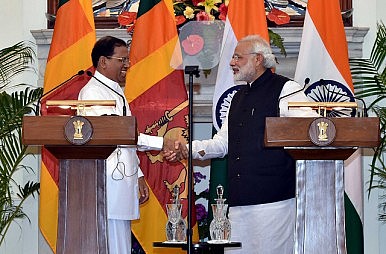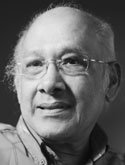A Brief Colonial History Of Ceylon(SriLanka)
Sri Lanka: One Island Two Nations
A Brief Colonial History Of Ceylon(SriLanka)
Sri Lanka: One Island Two Nations
(Full Story)
Search This Blog
Back to 500BC.
==========================
Thiranjala Weerasinghe sj.- One Island Two Nations
?????????????????????????????????????????????????Tuesday, March 31, 2015
Sri Lanka Naval officers detained over Tamil politician murder

A
National Anti-War Front protest in Colombo over the assassination of
Tamil MP Nadarajah Raviraj, in November 2006. — File Photo: Sriyantha
Walpola
Three Sri Lankan Navy personnel, including two officers, have been
detained by the police here under the anti-terrorism Act for the alleged
murder of a popular Tamil lawmaker in 2006 that snowballed into a major
human rights issue for the then government.
Nadarajah Raviraj, 44, was gunned down in his car along with his police guard as he left his residence here in November 2006.
Raviraj was a popular Tamil politician with an ability to communicate
with the Sinhala majority and was a rising star in the main Tamil party,
Tamil National Alliance.
A former mayor of Jaffna and a lawyer by profession, Raviraj openly
spoke out against the conflict between the military and LTTE in the
country’s north and east.
Police spokesman A.S.P. Ruwan Gunasekara said that the three Navy personnel are now being questioned over the 2006 murder.
“These three officers are being detained under the Prevention of
Terrorism Act. They are being questioned over Raviraj’s killing, as well
as killing the police officer who was present with the MP when he was
shot. The detained suspects are also being questioned on the abductions
and disappearances of several young men,” he said.
The murder which happened at the height of the government’s military
crackdown on the LTTE had became a major human rights accountability
issue for the earlier Mahinda Rajapaksa administration.
Sri Lanka under former President Rajapaksa was subject to three
consecutive UN Human Rights Council resolutions, the last of which
mandated an international inquiry on alleged rights abuses committed by
both government troops and the LTTE.
The Rajapaksa government had resisted the investigation dubbing it as a violation of Sri Lanka’s sovereignty.
The incumbent administration of President Maithripala Sirisena is also
opposed to an international investigation but has agreed to a credible
domestic probe with international technical assistance.
Proof of secret camps Prime Minister Wickremesinghe denies exist
 31 MARCH 2015
31 MARCH 2015
 Despite
Prime Minister Ranil Wickremesinghe's public denial, credible reports
have emerged to prove beyond any reasonable doubt that the Sri Lankan
military still operates secret camps in the north, where surrendered
ex-Tamil Tiger rebels and those who were made to disappear during and
after the war, have been held and tortured to-date.
Relatives and families of four such people who are currently held in
these secret camps in the Wanni for a prolonged period have reported
this matter to the International Committee of the Red Cross (ICRC) and
sought its help to get their loved ones released.
The reports of the operation of secret camps have come at a time when
Prime Minister Wickremesinghe during his three-day official visit to the
North late last week publicly denied claims made by Jaffna District
Parliamentarian of the Tamil National Alliance (TNA) Suresh
Premachandran in this regard.
"After we took over the government, there are no secret camps. I cannot
speak for the time before that," Mr Wickremesinghe said in Jaffna on
Friday (March 27).
Keppapulavu secret camp
Balananthini Viswanathan has filed a writ application in the Mullaitivu
district court demanding the court to help releasing her husband
Chelliah Visvanathan who had surrendered to the army during the final
days of the war in May 2009 and gone disappeared since then.
She claims that her husband has been held in an army camp in
Keppapulavu, a fertile village in the Mullaitivu district. After the
war, the military has taken over this village denying access to about
350 native families displaced by the war.
Her writ application is set to be taken up tomorrow in the court.
About 50 held in Keppapulavu secret camp
Despite
Prime Minister Ranil Wickremesinghe's public denial, credible reports
have emerged to prove beyond any reasonable doubt that the Sri Lankan
military still operates secret camps in the north, where surrendered
ex-Tamil Tiger rebels and those who were made to disappear during and
after the war, have been held and tortured to-date.
Relatives and families of four such people who are currently held in
these secret camps in the Wanni for a prolonged period have reported
this matter to the International Committee of the Red Cross (ICRC) and
sought its help to get their loved ones released.
The reports of the operation of secret camps have come at a time when
Prime Minister Wickremesinghe during his three-day official visit to the
North late last week publicly denied claims made by Jaffna District
Parliamentarian of the Tamil National Alliance (TNA) Suresh
Premachandran in this regard.
"After we took over the government, there are no secret camps. I cannot
speak for the time before that," Mr Wickremesinghe said in Jaffna on
Friday (March 27).
Keppapulavu secret camp
Balananthini Viswanathan has filed a writ application in the Mullaitivu
district court demanding the court to help releasing her husband
Chelliah Visvanathan who had surrendered to the army during the final
days of the war in May 2009 and gone disappeared since then.
She claims that her husband has been held in an army camp in
Keppapulavu, a fertile village in the Mullaitivu district. After the
war, the military has taken over this village denying access to about
350 native families displaced by the war.
Her writ application is set to be taken up tomorrow in the court.
About 50 held in Keppapulavu secret camp
 Another
ex-LTTE cadre, who had also surrendered to the army in May 2009 has
contacted one of his relatives from this Keppapulavu secret camp and
informed that about 50 people were being held in the camp.
The JDS withholds the details of this person and that of his relatives for safety reasons.
Meanwhile, a mother whose son was made to disappear in 2011 said that
her son Ravindran Mayuran has been brought to the Mancholai hospital in
Mullaitivu late last month for a urinary treatment.
According his mother Rosemalar, some family relatives have met Mayuran
and spoken to him at the hospital on February 27 around 10 am, thinking
that he has been released from the military custody. But when she went
to the hospital on the following morning to visit her son, she was told
by the doctors that no one in that name has been treated or admitted to
the hospital.
The JDS reliably learns that the military personnel who brought 27-year
old Mayuran to the hospital have warned the hospital administration not
to maintain any record with regard to his admission or treatment at the
hospital.
Mullaitivu secret camp
According to Rosemalar, Mayuran has told the relatives during the brief
meeting that he has been held and tortured in an army camp in
Mullaitivu. He has also said that he has been badly affected and often
falling ill due to excessive torture.
Mayuran, a father of one, from 8th Division Manthuvil in Mullaitivu was
first taken away from Arunasalam Welfare Centre in Chettikulam Manik
Farm area in May 2009 by the military for interrogation. He was held and
interrogated in Nelukkulam, Vavuniya Chinna Mankulam and Welikanda
military detention camps.
He was released on 16 November, 2010 at a function at Vavuniya Tamil
Maha Vidyalayam and was living with his wife and child at Kadirgamar
Welfare centre. He used to go out and do some odd jobs to look after his
family.
On 2nd February, 2011 he was made to disappear again while returning
from work. The family has informed the ICRC and was waiting to know his
whereabouts. It is under this circumstance that he has been met by some
relatives and neighbours on February 27 while waiting for a urinary
treatment at the Mancholai hospital. He had to end his conversation with
them abruptly after noticing that he was being closely monitored by
those who brought him to the hospital.
Jegatheepan Devaraja who was made to disappear in April 2009 has been
seen by her cousin sister travelling in a military truck. The 27 year
old boy from Mullaitivu was seen wearing a dress similar to the army.
This has now been informed to the ICRC.
The native of Keppapulavu has been forcibly resettled in a jungle area
east of Keppapulavu in September 2012. The 59 Division of the army has
set up a massive camp in Keppapulavu, which includes a government
school.
MP Suresh Premachandran has demanded the new government in parliament
and outside to conduct a thorough investigation into the credible
reports of secret camps.
Another
ex-LTTE cadre, who had also surrendered to the army in May 2009 has
contacted one of his relatives from this Keppapulavu secret camp and
informed that about 50 people were being held in the camp.
The JDS withholds the details of this person and that of his relatives for safety reasons.
Meanwhile, a mother whose son was made to disappear in 2011 said that
her son Ravindran Mayuran has been brought to the Mancholai hospital in
Mullaitivu late last month for a urinary treatment.
According his mother Rosemalar, some family relatives have met Mayuran
and spoken to him at the hospital on February 27 around 10 am, thinking
that he has been released from the military custody. But when she went
to the hospital on the following morning to visit her son, she was told
by the doctors that no one in that name has been treated or admitted to
the hospital.
The JDS reliably learns that the military personnel who brought 27-year
old Mayuran to the hospital have warned the hospital administration not
to maintain any record with regard to his admission or treatment at the
hospital.
Mullaitivu secret camp
According to Rosemalar, Mayuran has told the relatives during the brief
meeting that he has been held and tortured in an army camp in
Mullaitivu. He has also said that he has been badly affected and often
falling ill due to excessive torture.
Mayuran, a father of one, from 8th Division Manthuvil in Mullaitivu was
first taken away from Arunasalam Welfare Centre in Chettikulam Manik
Farm area in May 2009 by the military for interrogation. He was held and
interrogated in Nelukkulam, Vavuniya Chinna Mankulam and Welikanda
military detention camps.
He was released on 16 November, 2010 at a function at Vavuniya Tamil
Maha Vidyalayam and was living with his wife and child at Kadirgamar
Welfare centre. He used to go out and do some odd jobs to look after his
family.
On 2nd February, 2011 he was made to disappear again while returning
from work. The family has informed the ICRC and was waiting to know his
whereabouts. It is under this circumstance that he has been met by some
relatives and neighbours on February 27 while waiting for a urinary
treatment at the Mancholai hospital. He had to end his conversation with
them abruptly after noticing that he was being closely monitored by
those who brought him to the hospital.
Jegatheepan Devaraja who was made to disappear in April 2009 has been
seen by her cousin sister travelling in a military truck. The 27 year
old boy from Mullaitivu was seen wearing a dress similar to the army.
This has now been informed to the ICRC.
The native of Keppapulavu has been forcibly resettled in a jungle area
east of Keppapulavu in September 2012. The 59 Division of the army has
set up a massive camp in Keppapulavu, which includes a government
school.
MP Suresh Premachandran has demanded the new government in parliament
and outside to conduct a thorough investigation into the credible
reports of secret camps.

 Another
ex-LTTE cadre, who had also surrendered to the army in May 2009 has
contacted one of his relatives from this Keppapulavu secret camp and
informed that about 50 people were being held in the camp.
Another
ex-LTTE cadre, who had also surrendered to the army in May 2009 has
contacted one of his relatives from this Keppapulavu secret camp and
informed that about 50 people were being held in the camp.The Ideal V. Practical In Electoral Reforms

By Sujata Gamage -March 31, 2015
Electoral reform logjam broke loose when MPs agreed to an increase to
the size of the parliament from 225 to 250. The idealists are up in
arms. What is the ideal size of the parliament? What is the ideal mix of
representation? They are asking now. These are good questions, but,
unfortunately that bus left long ago, as far back as 2007.
The Parliamentary Select Committee on Electoral Reforms was constituted
in 2003 and they issued their Interim report in 2007. Interestingly the
final report was never published, but, I have posted a scanned copy on
my personal Web site. If anybody bothers to read the document, it shows
the committee grappling with difficult questions. For example, there is a
dissenting opinion by the Sri Lanka Muslim Congress and Ceylon Workers
Congress where they challenge the report extensively but offer
constructive suggestions at the end.
In trying to meet multiple demands something has to yield. If it takes
an increase to bring about changes, it is worthy increase I think. The
number 250 need not be a done deal either. A delimitation commission can
be given a charge to consider the other alternatives such as 235, 240
and 245. We can also ask the question what can be done with 250 do that
cannot be done with 245 and so on. Those are little questions indeed.
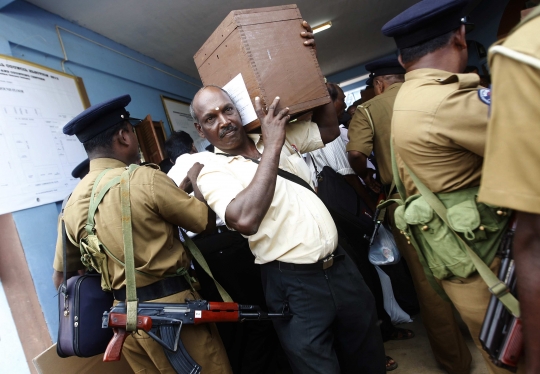 We
do need people who can look at the bigger picture. Do we want a soviet
like government where for example, local councils would be smaller and
closer to the communities and the chair and vice chair from each
represent the communities in the provincial councils. The parliament
would be small. It would leave local issues to local governments and
provincial issues to provincial governments. Nice theory, but, has
anybody thought of the political and policy tools through which we
achieve such? If other countries achieved such significant changes how
did they do it? How did we achieve big changes in the past? If anybody
wants big changes , I suggest they use their time to do the research and
prepare for the big policy moment which may strike.
We
do need people who can look at the bigger picture. Do we want a soviet
like government where for example, local councils would be smaller and
closer to the communities and the chair and vice chair from each
represent the communities in the provincial councils. The parliament
would be small. It would leave local issues to local governments and
provincial issues to provincial governments. Nice theory, but, has
anybody thought of the political and policy tools through which we
achieve such? If other countries achieved such significant changes how
did they do it? How did we achieve big changes in the past? If anybody
wants big changes , I suggest they use their time to do the research and
prepare for the big policy moment which may strike.
We did have big policy moment in our country when we changed from a
majoritarian FPP system of elections to a PR system in 1978. We are now
getting ready to move into in a mixed system of the two, and it is a
given, politically. It is not a bad move either. The world is moving
from majoritarian systems or PR systems to mixes of the two.
Is this a time for anything bigger? I doubt it. We are more than
three-quarters way through our policy window of 100 days. It is not a
time for big policy thinking. Our focus would be indeed to do the little
tweaks to changes that have been on the agenda for years. Two
particular tweaks come to mind.
How much FPP and how much PR?
Those who talk about 50:50 solution do not ask a key question. What if
50 people from one party contest in 50 electorates in a FPP system and
other 50 come from a PR of the votes cast, where are you going to find
the people to fill those 50 PR seats? Which question leads us to our
next tweak opportunity.
Who will fill the PR seats?
The obvious answer is a list submitted the by the party. That is indeed
the norm in mixed methods or 100% PR systems. However, in Sri Lanka we
have had disastrous results with elections to District Development
Councils in 1982 where the lists were stuffed with friend and family.
Have we grown up as a country since then? I doubt it. Awarding PR seats
to the best runners-up as from FPP races in proportion to the votes
garnered by them as proposed in in the 2007 report of the Parliamentary
Select Committee (PSC) on Electoral Reforms is still the best
alternative.
Innovations through tweaking
Innovations do not come not from arm-chair theorizing but trying to
tweak within limitations. Tired of the debate over how much FPP or how
much PR we asked ourselves why not use 100% PR, more or less, to decide
how many seats each party is getting. Then use the FPP winners and the
best runners-up to fill the seats. WE call this this system PSC-NZ
combination because the first part comes from New Zealand and the second
part from the PSC. More on the PSC-NZ method later.
Jayampathy on 19th A, electoral reforms and 100-day program
 President’s
Counsel Dr. Jayampathy Wickramaratne expressed the importance of
abolishing the executive presidency and electoral reforms under two
different constitutional amendments. Dr. Wickramaratne, who is involved
in constitutional reforms, expressed his candid views about the 19th
Amendment, electoral reforms and the 100-day program. He is also a
member of the National Movement for Social Justice and a dissident of
the Lanka Sama Samaja Party (LSSP).
President’s
Counsel Dr. Jayampathy Wickramaratne expressed the importance of
abolishing the executive presidency and electoral reforms under two
different constitutional amendments. Dr. Wickramaratne, who is involved
in constitutional reforms, expressed his candid views about the 19th
Amendment, electoral reforms and the 100-day program. He is also a
member of the National Movement for Social Justice and a dissident of
the Lanka Sama Samaja Party (LSSP). Following are excerpts:
March 31, 2015
Q: What are your remarks about the 19th Amendment?
A: The 19th Amendment that was gazetted has now been presented to Parliament. In the meantime the Cabinet of Ministers has approved the second set of changes to the 19th Amendment. They have shared it with leaders of other parties and it has also found its way to the newspapers. I am satisfied with the 19th Amendment read together with the changes proposed by the Cabinet.
A: The 19th Amendment that was gazetted has now been presented to Parliament. In the meantime the Cabinet of Ministers has approved the second set of changes to the 19th Amendment. They have shared it with leaders of other parties and it has also found its way to the newspapers. I am satisfied with the 19th Amendment read together with the changes proposed by the Cabinet.
Heritage & Nationalism: A Bane Of Sri Lanka

By Jude Fernando -March 30, 2015
“Those who control the past control the future. Those who control the present control the past” -George Orwell
“The past is a foreign country: they do things differently there”- L.P. Hartley.
The current practices of archeology and their complicity with rebranding
of archaeological heritage as national heritage have contributed to the
ethnic tensions, civil war, injustice, inequality, and violence in the
Sri Lankan society. The pretense that archaeology is an apolitical
profession is a form of complicity with these social ills. In many
societies, archaeological knowledge was the historical basis for nation
builders and their antagonists (e.g. separatists/sub nationalists), who
reclaimed or plundered their antiquity, and reshaped it to support
discriminatory social, economic and political practices. Sri Lanka is no
exception.
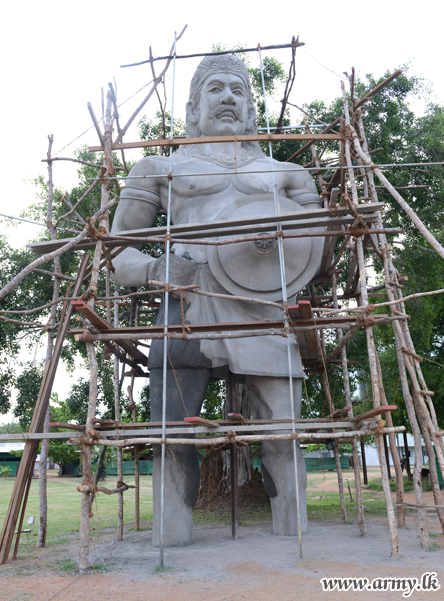
Formerly a Tamil village known as Kokachankulam located in Vavunia North has been renamed as Nandimitragama
Nation building and archeology are intimately related. According to
Randall McGuire “nationalists muster archaeology both to prove their
myths dispassionately and to reveal and reconstruct an “authentic”
objectified heritage.” In most societies archeology evolves and becomes
institutionalized within the political and cultural parameters set by
the nation-building priorities set by the state. Under these
circumstances archeology is politics by other means. Denying the
political nature of archeology is a form of self-deception.
Good governance (Yaha Palanaya),
as a political response to pernicious social and political consequences
of nation building, will elude us unless we are prepared to radically
change the current mindset about the relationship between country’s
archaeological heritage and culturally distinct collective identities
and landscape. People’s entitlement for freedom, equality and justice
should be the driving force behind the reasons for our search for
archeological knowledge and how we chose to act upon it. Archeology
fails to make a positive contribution to the society while it is a
prisoner of the ethnonationalist politics of the state. Under such
circumstances archeology becomes complicit with political and cultural
practices that use archeology not “necessarily always to better
understand the past, but to use the past to legitimize the present.” The
point here is not that the past “literally speaks to the present,” but
rather, “when the past is used to legitimize the present, we insist that
it is saying what we want to hear, even if the thoughts we are imputing
to the past may have been alien to it.”[1] Read More
Sinhala Colonization In The North Sped Up
India’s Key to Sri Lanka: Maritime Infrastructure Development
To surpass China in Sri Lanka, India needs to pursue proactive and dynamic diplomacy.
Indian Prime Minister Narendra Modi’s recent trip to Sri Lanka
highlights New Delhi’s reawakening to the strategic position that Sri
Lanka holds in India’s neighborhood. Since 2008, India has watched as
China built port facilities, highways, and other major infrastructure in
Sri Lanka.
India’s Key to Sri Lanka Maritime Infrastructure Development by Thavam Ratna
India’s Key to Sri Lanka Maritime Infrastructure Development by Thavam Ratna
War of words between Chinese firm and Sri Lanka escalates over Colombo Port City

The war of words over the stalled Colombo Port City project escalated
yesterday as China Communications Construction Company (CCCC) called the
Sri Lankan government’s recent statement on the matter “factually
incorrect”.
Finance Minister Ravi Karunanayake had told the South China Morning Poston Friday that CCCC had failed to furnish the necessary documents within the two-week deadline set for it by the government.
The new government in Colombo that came to power in January put Port
City, a giant real estate reclamation project off the capital, on hold
earlier this month alleging irregularities. The government, which
maintains CCCC had not obtained the requisite clearance to start the
project, gave it two weeks to show all necessary documents to prove
otherwise.
“CCCC, upon being issued the temporary suspension of the project via a
letter on March 6, 2015 by the Government of Sri Lanka, reiterates that
it responded within two working days with all relevant approvals and
permits afforded to the Project Company,” the company said in a
statement to thePost yesterday.
“They run full-page advertisements in newspapers justifying their
actions, but when we tell them to submit documents, they draw a blank,”
Karunanayake had said in his interview.
The company reiterated that according to its agreement with the previous
government, “the obligation to obtain the necessary permits and
approvals for the project is with the Sri Lankan Government and not the
Project Company”.
CCCC also maintained that the “agreement was authorised by Sri Lanka’s
Attorney General and approved by the Cabinet of Sri Lanka”,
contradicting the new government’s stand.
Colombo Port City has become a bone of contention between China and Sri
Lanka. In his meeting with the new Sri Lankan President, Maithripala
Sirisena, in Beijing last week, President Xi Jingping urged him to
protect the legitimate interests of Chinese companies. Xinhua reported
that Sirisena had said the current situation is “temporary and the
problems do not lie with China”.
Colombo Port City is among the several Chinese-funded projects that have
come under the scrutiny of the new government, which alleges
large-scale corruption by the previous administration of pro-China
Mahinda Rajapaksa, who was ousted in the presidential elections in
January.
But unlike most projects by Chinese companies in the South Asian
country, Colombo Port City is not bankrolled by Chinese loans. It is
financed entirely by equity from CCCC or funds raised through it, with
no commitment from the Sri Lankan government. Under the deal for the
project, CCCC would reclaim 233 hectares of land. Of this, it would keep
108 hectares
Meanwhile, shrugging off the controversy over Chinese projects and
companies operating in Sri Lanka, China Merchants Holdings
(International) yesterday said it will make Sri Lanka one of its
regional headquarters.
The subsidiary of state conglomerate China Merchants Group is the
largest shareholder of Colombo International Container Terminals (CICT),
its joint venture with the Sri Lanka Ports Authority (SLPA).
The company has built the Colombo South Container Terminal in the
capital under a 35 year build-operate-transfer agreement with the SLPA.
Sri Lanka is an important trade and shipping hub for the Indian
subcontinent, and some of its staff there had been relocated to the
firm’s other overseas offices “because of the excellent work they had
done in building and operating this port”, managing director Hu Jianhua
said. He added that CICT was the firm’s first overseas greenfield
project and a testing ground for its global aspirations.
The terminal, opened in April last year, handled 0.68 million 20-foot
standard containers as of the end of last year. The volume is projected
to exceed 1 million this year.
CMHI reported its net profit for last year rose 14.7 per cent to HK$4.6 billion, beating analysts’ estimates.
CCCC’s net profit for last year also unexpectedly rose 11.3 per cent to 14 billion yuan.
In Memory Of My Father- Professor Sucharita Gamlath

By Sharmila Gamlath -March 31, 2015
My father, late Professor Sucharita Gamlath was
one of the most prolific scholars of his time. During his lifetime, he
continuously demonstrated his acumen in a range of fields, fulfilling
the roles of author, teacher, literary critic, linguist, and political
activist contemporaneously. He certainly needs no introduction among the
general public of Sri Lanka. Since his demise on the 30th of
March 2013, there have been many eloquent accounts of his contributions
to the fields of Sinhala language and literature, literary criticism
and political views. However, on the eve of his second death
anniversary, I thought it would be apt to supply an insider’s account of
his life to the large number of Sri Lankan whose lives he enriched with
his work.
An obvious question that may emerge is why I did not write such a memoir
as soon as he passed away or, at least, why I did not write one last
year, in conjunction with his first death anniversary. In fact, several
friends and family members did urge me to write an appreciation about
him earlier. However, during a couple of previous attempts, I had
tremendous difficulty dealing with the myriad of emotions that crossed
my mind. Recently, when I spoke to a friend about this state of haziness
I was experiencing, he reassured me that it is only human to feel that
way. So I decided that was best to wait patiently till I was emotionally
prepared to get down to this task. Now I am.
Sucharita Gamlath’s work ethic
It is worth pondering over what motivated my father to work so hard. I
feel now that it was pure passion, the urge to keep utilizing his
brilliance for as long as he could. The expected monetary payoff
associated with his work was not a critical source of motivation for
him. It makes me feel that scholars produce their greatest works when
they engage in their activities with the sole intention of producing an
outcome which challenges them, rather than treating a scholarly work
like a pail of milk which can be sold and many things bought with the
money. Engaging in scholarly work simply for extrinsic gains such as
monetary rewards, career progress and recognition could sometimes
negatively affect the quality of one’s work. The selfless gratification
he got from engaging in his work was probably the magic formula for my
father’s literacy success.
My father derived the greatest happiness from writing tirelessly.
Usually, he organized his working day into three parts: he would
generally get some writing -and perhaps reading- done before breakfast.
After than he would sit at his writing table till lunch. After than he
had a long nap, and after evening tea, he would go back to his writing
and only stop at about 9.30pm.
Government of good governance dethroning rule of force and enthroning rule of law – Central PC chairman jailed
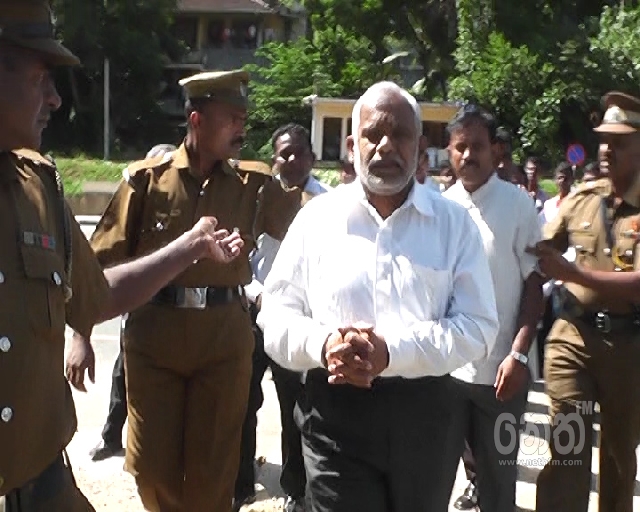
 (Lanka-e-News-
31.March.2015, 10.00PM) Under the newly elected government of good
governance which is committed to dethroning rule of force and enthroning
rule of law ,as well as demonstrating what is independence of
judiciary and the paramount importance of upholding the rule of law, a
politico , the prime suspect who was charged with violating election
laws in a case that was filed several years ago was sentenced to jail
today. The politico who was sentenced to two and half years in jail is
Mahinda Abeykoon, the chairman of the central provincial council cum
SLFP chief organizer Pahathahewaheta .
(Lanka-e-News-
31.March.2015, 10.00PM) Under the newly elected government of good
governance which is committed to dethroning rule of force and enthroning
rule of law ,as well as demonstrating what is independence of
judiciary and the paramount importance of upholding the rule of law, a
politico , the prime suspect who was charged with violating election
laws in a case that was filed several years ago was sentenced to jail
today. The politico who was sentenced to two and half years in jail is
Mahinda Abeykoon, the chairman of the central provincial council cum
SLFP chief organizer Pahathahewaheta .
This verdict was delivered by Kandy high court judge Ms. Menaka
Wijesundara on charges filed against the accused of forcibly entering a
polling center at Pahathahewaheta and engaging in election violence
during the general elections held on 5 th December 2001 – that is 14
years ago .
The case was filed against Mahinda Abeykoon on charges of unlawful
assembly , criminal trespass ,use of force and engaging in disruptive
activities under the election laws. Of the 14 suspects against whom
this case was filed , two of them died while the case was on going in
court . 11 other suspects were discharged on the previous date since
there weren’t enough evidence against them .
---------------------------
by (2015-03-31 17:34:00)
by (2015-03-31 17:34:00)
Police tear gas protesting university students

UPDATE: The
Galle Road has been closed from Kollupitiya Junction to Galle Face
Roundabout due to the protest launched by university students, polcie
spokesman ASP Ruwan Gunasekara said.
Heavy traffic congestion was reported along Galle Road, Thunmulla and
Bambalapitiya due to a protest march by the university students heading
towards Colombo.
Police advised motorists to use alternative routes in order to avoid inconveniences.
The protest march, organized by the Inter University Students’
Federation (IUSF), commenced from the near the University of Sri
Jayawardenapura based on several demands.
Police used tear gas to disperse the protestors who were obstructing traffic near the Kollupitiya Junction.
Sri Lanka confronts ex-leader’s extravagant projects in ‘middle of nowhere’
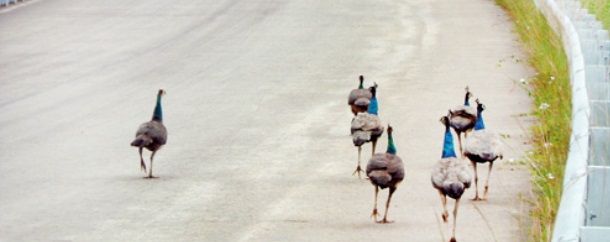
[Hundreds if not thousands of peacocks pose a serious threat to airline traffic at the Mattala Rajapaksa International Airport]
This remote coastal scrubland, a haven for wild elephants and migratory
birds that is several hours away from the nearest city, seems like an
odd place to attempt to create a major commercial hub..
Yet such was the whim of former President Mahinda Rajapaksa, a local son
who, thanks to Chinese loans, poured immense sums into pet projects
during the decade he held this island nation in his grip.
Since he was voted out of office in January, Rajapaksa’s extravagant
spending in his home district, much of it named for himself, looks ever
more like monuments to folly.
A giant Indian Ocean harbor being blasted out of the island’s southern
shoreline has seen costs soar well past $1 billion, and officials say it
is unlikely to break even for years. A $210-million international
airport built two years ago has hundreds of employees but receives just a
handful of passengers a day.
Sri Lankan president admits election defeat; challenger sworn in
The 35,000-seat Mahinda Rajapaksa International Cricket Stadium and a
new convention center are rarely used, as are miles of expansive new
highways that see little traffic apart from the occasional herd of
cattle.
“It’s a crying shame how much money was spent,” said Harsha de Silva,
deputy minister for policy planning and economic affairs in Sri Lanka’s
new government. “Why is an airport in the middle of nowhere? Why are you
building a road to the middle of nowhere?”
It’s not as if Sri Lankans didn’t ask those questions before, but under
Rajapaksa’s increasingly despotic administration, dissent was ignored or
punished. After his narrow and surprising election defeat, the country
of 20 million is waking up to the excesses of his rule with what appears
to be a collective hangover.
SriLankan Airlines, the deeply indebted national carrier, announced that
it would cease operating from Mattala Rajapaksa International Airport
in the town of Mattala, north of Hambantota. The twice-daily flights
were losing the airline $8 million a year, company officials said.
New President Maithripala Sirisena has ordered a review of all of
Rajapaksa’s projects – and it is a long list. To cement the government’s
victory in a 26-year civil war against northern Tamil rebels, Rajapaksa
embarked on a $6-billion spending binge on infrastructure projects
starting in 2009.
More than two-thirds of the projects, including the port and airport at
Hambantota, were financed by Chinese banks at interest rates as high as
6.3% annually, several times what other lenders offered, and did not go
through open bidding processes, officials say. Authorities are
investigating whether contracts were padded to benefit members of
Rajapaksa’s government, which included more than two dozen members of
his extended family. No charges have been filed.
“It’s a crying shame how much money was spent. Why is an airport in the
middle of nowhere? Why are you building a road to the middle of
nowhere?”
– Harsha de Silva, deputy minister for policy planning and economic affairs in Sri Lanka
– Harsha de Silva, deputy minister for policy planning and economic affairs in Sri Lanka
In the meantime, finance officials are exploring ways to restructure the
Chinese loans. Government lawyers are poring over contracts, trying to
scale back some projects that haven’t yet begun, such as a 500-acre
development on reclaimed land in the capital, Colombo, where the
ex-president envisioned luxury high-rises and a Formula One racetrack.
To Rajapaksa, the projects were powerful symbols of Sri Lanka’s
expansion from a small, war-ravaged economy to one of the fastest
growing in South Asia.
He and members of his family did not respond to requests for comment. In
an interview this month with the South China Morning Post, he defended
his actions.
“I wanted development for Sri Lanka and China was the only one which had
the resources and the inclination to help me,” Rajapaksa said.
Sri Lanka was so unfortunate for not to get the service of Mahinda
Rajapakse for a another term being the leader of the country. Had he
been there for another 5 years or 10 years, Sri Lanka would have been
truly a miracle of South Asia with very high living standards and per
capita income for…
Opponents counter that he built by fiat, bypassing environmental studies
and economic assessments, and that China, seeking to boost its
influence on the doorstep of rival India, took advantage of his haste.
“They were vanity projects for Rajapaksa, plain and simple, and China
was quite happy to nurture his vanity,” said Paikiasothy Saravanamuttu,
executive director of the Center for Policy Alternatives, a think tank
in Colombo.
Business leaders in Hambantota said they were never consulted about the
giant structures that began proliferating in their district like
mushrooms after a monsoon.
A predominantly fishing and farming area that is still recovering from
damage sustained in the 2004 Indian Ocean tsunami, Hambantota
historically has been one of the poorer pockets of the country.
Airplane tickets and use of the convention center, as well as a
five-star hotel planned for the port complex, are out of the financial
reach of most residents, raising questions about their long-term
viability.
Suspected war criminal Jagath Dias opens school in Vanni


War Crimes in Sri Lanka-genocide
A new school building constructed at the Roman Catholic College in Puthukkudiyiruppu wasopened by suspected war criminal Major General Jagath Dias earlier this month.
Mr Dias, who is the commander of the
Mullaithivu headquarters of the Sri Lankan army, was leading an army
division during the armed conflict and is thought to be responsible for
mass atrocities committed during the final phase.
 |
The commander was last year refused
entry into Australia over his role in the final stages of the armed
conflict and allegations of war crimes and crimes against humanity.
Only two days before the opening of the school on March 4, Sri Lanka's Foreign Minister Mangala Samaraweera, told the UN Human Rights Council in Geneva, that the Sri Lankan military had ceased its civilian activities.
"Just days after assuming office,
the President replaced the former military governors of the Northern and
Eastern provinces of the country with two senior former civil servants.
This set in motion the process of strengthening civilian administration
in these provinces including the cessation of military involvement in
civilian activities, review of high-security zones and releasing land
for resettlement of the internally displaced," Mr Samawaraweera had
said.
The military's ongoing involvement
in Tamil affairs almost 6 years after the end of the armed conflict has
been widely condemned by Tamil politicians and activists, with numerous
calls for the new president, Maithripala Sirisena to demilitarise the
North-East.
 |
 |
Sri Lankan army extends 'welfare projects' in Jaffna (29 Mar 2015)
Sri Lankan military hold prayer service during Jaffna temple festival (14 Feb 2015)Sri Lanka military hands out chickens in Kilinochchi (14 Jan 2015)Military recruits Tamil youths to work in army farm (14 Jan 2015)
Sri Lankan army distribute uniforms to Jaffna school children (14 February 2015)
Subscribe to:
Posts (Atom)






